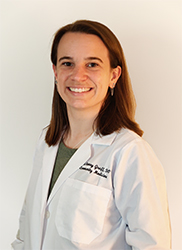By: ANDREA C. CUNIFF, M.D.
The opioid crisis continues in Maryland and has gotten worse as the powerful drug fentanyl is increasingly mixed into illegal drugs. From 2022 to 2023, the state saw 2,583 fatal overdoses, and fentanyl was involved in about 81% of those deaths.
In response, there has been a growing use of naloxone (commonly known by the brand name NARCAN®), a medication approved by the Food and Drug Administration that rapidly reverses opioid overdose. It has been used to save lives in Maryland. Healthcare officials encourage its distribution and use by the public.
What is naloxone?
Naloxone is an opioid antagonist: it attaches to opioid receptors in the body, reversing and blocking the effects of opioids, including heroin, morphine and oxycodone. Naloxone can quickly restore normal breathing to a person whose breathing has slowed or stopped because of an opioid overdose. However, it only reverses opioids and will not work on other drugs like cocaine or methamphetamine.
How naloxone is given
Naloxone should be given to any person who shows signs of an opioid overdose. It can be administered as a nasal spray or an injection. Learn how to respond to an overdose with guidelines from the Maryland Department of Health.
Signs of opioid overdose
- The person’s face is extremely pale and/or feels clammy to the touch
- Their body goes limp
- Their fingernails or lips have a purple or blue color
- They start vomiting or making gurgling noises
- They cannot be awakened or are unable to speak
- Their breathing or heartbeat slows or stops
Source: Substance Abuse and Mental Health Administration
Who can give naloxone?
Naloxone is widely used by police officers, emergency medical technicians (EMTs) and non-emergency first responders. In Maryland, anyone can administer naloxone and training is not required, but your healthcare provider or pharmacist can advise you how to use it.
You can buy naloxone at a pharmacy without a prescription. Free naloxone may also be available from Overdose Response Programs located throughout the state.
What to keep in mind
Naloxone works for about 30 to 90 minutes, but many opioids remain in the body longer than that, so a person can still experience the effects of an overdose after naloxone wears off. If you administer naloxone to an overdose victim, you should still call 911 as soon as possible for immediate medical attention.
Side effects from naloxone are rare, but some people might have allergic reactions to it. Overall, naloxone is a safe medicine and has the potential to save many lives.
In the state of Maryland you are protected under the Good Samaritan Law. This means you will not be arrested or prosecuted if you administer naloxone while you are under the influence of alcohol or illicit drugs, or are in possession of illicit drugs at the time of administration.
More about naloxone
 Dr. Cuniff treats patients in the Annapolis office. She is certified by the American Board of Family Medicine and earned her medical degree from the University of Maryland School of Medicine.
Dr. Cuniff treats patients in the Annapolis office. She is certified by the American Board of Family Medicine and earned her medical degree from the University of Maryland School of Medicine.






